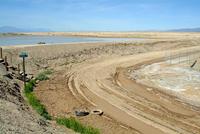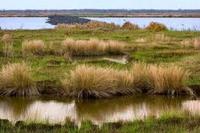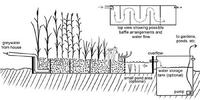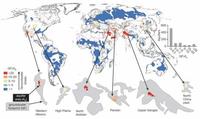-
Rural California country faces levee dilemma

About 400 homes and rich farmland in District-10 of Marysville, California risk being flooded should the levees protecting the area fail. The levees, stretching over twenty-eight miles, were built in the early 1900s. The area’s low population may be one reason why county officials have neglected making improvements to the levees in District-10. Local opponents of investment in shoring up the levees are worried that if the levees are improved and the area made safer, “It would open the door for more agribusiness type things, but it would also open the door for more subdivisions,” in the words of one of them.
-
-
N.J. coastal wetlands moderated some of Hurricane Sandy’s fury

Monitoring sensors along the New Jersey coast recorded marsh and wetland swelling during Hurricane Sandy. That swelling is an indication of marshes’ ability to absorb some of the storm surge — which, in hard-hit urban areas, had resulted in high water marks up to seven feet during Hurricane Sandy. Resilient, healthy wetlands near coastal areas have a key role in protecting local communities from hurricane-induced storm surges and flooding.
-
-
First ever evidence discovered of a comet striking Earth

The first ever evidence of a comet entering Earth’s atmosphere and exploding, raining down a shock wave of fire which obliterated every life form in its path, has been discovered. The comet entered Earth’s atmosphere above Egypt about twenty-eight million years ago. As it entered the atmosphere, it exploded, heating up the sand beneath it to a temperature of about 2,000 degrees Celsius, and resulting in the formation of a huge amount of yellow silica glass which lies scattered over a 6,000 square kilometer area in the Sahara.
-
-
U.S. nation-wide quake early-warning system
The United States is likely to be struck by a major earthquake within the next twenty years. Scientists say that instead of waiting to experience a devastating earthquake and then invest in preventative measures for subsequent earthquakes, the country should be proactive and take action before the event. Investing in a nationwide earthquake warning system will save lives, prevent destruction of key infrastructure, and reduce the size of the economic loss that may result from an earthquake.
-
-
Bolstering water security in a crowded world

With limited water and the increasing number of people depending on it – there will be more than nine billion people on the planet by 2050 — water security is tenuous. Integrated water management plans using “blue,” “green,” and “gray” water, however, can increase water security by allowing agriculture to rise to the challenge of feeding a growing world population while leaving enough water for other uses.
-
-
A state of disrepair: Thousands of U.S. aging bridges risk collapse
Of the 607,380 bridges listed in the recent U.S. National Bridge Inventory, 65,605 bridges are classified as “structurally deficient” and 20,808 as “fracture critical,” with 7,795 of those bridges designated as both structurally deficient and fracture critical. Experts say this indicates significant disrepair and a risk of collapse. These 7,795 structurally deficient, fracture critical bridges carry more than twenty-nine million drivers a day.
-
-
Delaware prepares for sea-level rise

Benjamin Franklin said that that an ounce of prevention is worth a pound of cure, and Governor Jack Markell of Delaware agrees. Two weeks ago he unveiled an initiative aiming to prepare his state for the effects of climate change and sea-level rise. Markell has signed an executive order requiring all state agencies to take sea-level rise into account when designing and locating state projects. The order also requires development of strategies to make state facilities and operations better prepared to deal with climate change and sea-level rise.
-
-
NYC enacts post-Sandy resiliency codes
Last week the New York City Council enacted laws implementing five recommendations of the Building Resiliency Task Force, led by Urban Green Council following Superstorm Sandy. This first package of laws makes NYC better prepared for future hurricanes and extreme weather.
-
-
Alabama State launches Nuclear Academy
A new academy at Alabama State University (ASU) will enhance security at nuclear, electric, and green-energy power installations across the United States and abroad. The new academy will provide comprehensive training for current and future security professionals who will offer infrastructure protection services to nuclear, electric and green-energy power installations.
-
-
NSF awards first coastal sustainability grants
More than half the world’s human population lived in coastal areas in the year 2000; that percentage is expected to rise to 75 percent by 2025. In wake of storms such as Hurricane Sandy, NSF grants will lead to better management of coastal environments.
-
-
How Sandy has changed storm warning procedures
Superstorm Sandy slammed against the U.S. Eastern Seaboard in October 2012, inundating iconic communities. Those communities have been rebuilding since then and things are almost back to normal for most. Something else, however, has had to be rebuilt as well: the structured procedures for issuing warnings. The goal is to help communities better comprehend what natural disasters will bring their doorsteps.
-
-
Los Alamos National Lab describes storm damage to affected New Mexico areas
Hours after a disaster declaration by Los Alamos County, Los Alamos National Laboratory officials on Friday described “millions” of dollars in damage to environmental monitoring stations, monitoring wells, access roads, and badly eroded canyon bottoms. “Last week we experienced an epic event,” said Dave McInroy, the laboratory’s program director for environmental corrective actions.
-
-
“In 30 years Iran will be a ghost town” if the country’s water situation does not improve

Issa Kalantari, a former agriculture minister during the presidency of Ayatollah Hashemi Rafsanjani and currently and advisor to President Hassan Rouhani’s cabinet, says Iran’s water crisis was especially grave. “Our main problem that threatens us, that is more dangerous than Israel, America or political fighting, is the issue of living in Iran. It is that the Iranian plateau is becoming uninhabitable”; “If this situation is not reformed, in 30 years Iran will be a ghost town.”
-
-
Deep earthquakes simulated in the laboratory
More than twenty years ago, researchers discovered a high-pressure failure mechanism that they proposed then was the long-sought mechanism of very deep earthquakes (earthquakes occurring at more than 400 km depth). The result was controversial because seismologists could not find a seismic signal in the Earth that could confirm the results. Seismologists have now found the critical evidence. Indeed, beneath Japan, they have even imaged the tell-tale evidence and showed that it coincides with the locations of deep earthquakes.
-
-
Missed opportunities to save water, energy
Water and wastewater managers are missing substantial opportunities to save energy and money, according to a new report.The report also identifies significant gaps in knowledge about the amount of water used to extract energy resources such as natural gas, oil, and coal, and to generate electricity.
-
- All
- Regional
- Water
- Biometrics
- Borders/Immig
- Business
- Cybersecurity
- Detection
- Disasters
- Government
- Infrastructure
- International
- Public health
- Public Safety
- Communication interoperabillity
- Emergency services
- Emergency medical services
- Fire
- First response
- IEDs
- Law Enforcement
- Law Enforcement Technology
- Military technology
- Nonlethal weapons
- Nuclear weapons
- Personal protection equipment
- Police
- Notification /alert systems
- Situational awareness
- Weapons systems
- Sci-Tech
- Sector Reports
- Surveillance
- Transportation
Advertising & Marketing: advertise@newswirepubs.com
Editorial: editor@newswirepubs.com
General: info@newswirepubs.com
2010-2011 © News Wire Publications, LLC News Wire Publications, LLC
220 Old Country Road | Suite 200 | Mineola | New York | 11501
Permissions and Policies
Editorial: editor@newswirepubs.com
General: info@newswirepubs.com
2010-2011 © News Wire Publications, LLC News Wire Publications, LLC
220 Old Country Road | Suite 200 | Mineola | New York | 11501
Permissions and Policies
